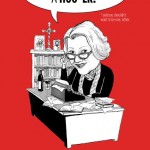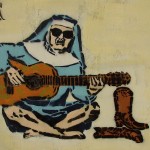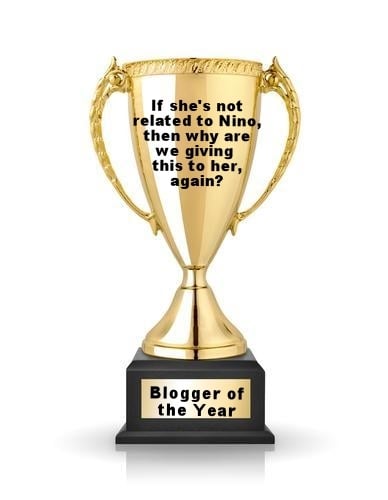Every once in a while, a public figure blips across my radar, and when I see him I am reminded of my birth-father, for there is a very strong physical resemblance between the two men. I noted it today to a friend who knows my background and my “story.”
“Whenever I see him,” I wrote, “it’s like looking at my father.”
My friend wrote back, “that must be disconcerting for you.”
I thought about that for a while and realized, no, seeing this public figure does not cause me distress, rather it makes me feel very badly for my father.
My “story” is my own, and it is one I am disinclined to share, partly because I abhor the sort of “perpetual victim” mentality in which others who have endured similar stress sometimes wrap themselves. Perhaps it is the only way they can cope, and if so, I won’t gainsay it but I have no patience for the “I am a survivor, let me tell you about my pain” mentality in my own life. I have never wanted a harrowing childhood ordeal to be the thing that defined me.
To my way of thinking, if you clutch all of that to your breast and never let go, you are willingly stunting yourself and your potential. You are selling yourself short by establishing that all you are, or will ever be, is a wounded child. I am certainly not unsympathetic, but my pragmatism compels me to move on. Aside from mentioning once or twice that I left home at a young age due to “a matter of familial tyranny,” or that a psychopathic patriarch held some sway over my early life, I have never felt remotely interested in sharing that part of my personal life on this site, and indeed, you’ll get no scintillating (or searing, depending on your heart and disposition) details from this girl, today. Or ever.
But having pondered my friend’s empathetic question, I will write about some of the odd lingering after-effects of abuse that I have observed.
There is a strange displacement that occurs within a child who has endured sexual abuse by a parent. There is the dissociative element, of course. A child overwhelmed by what is happening to him or her tends to find a safe spot somewhere inside herself, from which she can almost “watch” the abuse, as though it is happening to someone else. And there are recurring images that become meaningful to such a child in ways that others would never consider. When I think back on that time in my life, I see images of doorways. The doorway through which I would interiorly pray someone – anyone – would enter, to stop the terrible chaos surrounding me…the doorway I watched while cringing beneath my sheets and blankets, hoping no shadows would be moving within the dim light and heading my way.
The corner molding of a doorway means little to most people. To me, it holds out hope of rescue, or fear of ruin.
But it is the displacement that is interesting to me, and my friend’s inquiry. Disconcerting?
This public figure we’re talking about is an indisputably brilliant but rather controversial fellow. There is a chance, a slim one, that his striking resemblance to my father is more than coincidental; they may actually be distant and completely uncharted cousins. And perhaps that fact – that this successful man might be a relative to that unsuccessful man – is why I feel so badly for my father, and what demonstrates so keenly to me the displacement I am thinking about tonight.
My birth-father, anonymous and unremarkable to the world, was in many ways a man as brilliant as this public man. He was a phenomenal musician who could play numerous instruments, although he never had a lesson and could not read a note of music. He could draw out impressive building designs and mechanical designs, and engines. He invented things. Self-educated and rhetorically gifted, he could argue persuasively on politics and religion (he was against both). He had both the charisma and brains necessary to successfully lead efforts to unionize certain groups. He could run meetings according to Roberts Rule of Order and hold a room spellbound as he plowed through parliamentary procedures in such a way as to make everyone in the room feel enlarged, bouyed-up and important. He watched the nightly news and discussed it with me, and introduced me to critical thinking. A liberal Democrat at a time when that actually meant the embrasure of classical liberal standards, he was capable of looking at larger pictures, and so despite his admiration for Adlai Stephenson, he voted for Ike. Twice.
He took me fishing, and bowling. He brought me stuffed animals when I was sick. He was the only person, in my memory at least, who ever read to me a bedtime story, and the delicious sense of safety, singularity and undivided attention in those moments has kept those obscure stories affectionately alive inside me, all these years later.
And yet, he was a monster about whom – in past times of my life – I have written countless scenarios wherein I slay him, where I slip a stiletto into his sternum and pierce his terrible, dark heart. Or where I take a hatchet to his huge, brilliant and psychotic brain, or where I go to the cemetary carrying a long flowerbox which opens to reveal a shotgun, meant to shoot downward, into the grass, past the dirt and wood, to achieve penetration upon his corpse, and make sure that he is finally, really dead.
The rare nightmare about him will wake me up gasping for air, momentarily unsure about the current status of his physical existence.
The displacement of one who has endured the sexual abuse of a parent is a curious one, because it is not a banishment to a lonely island or a teeming crowd. Rather, it involves planting two feet on either side of a chasm and staring down into a deep fault-line you know you neither deserve (nor want) to fall into, and from which there may be no rescue if you do. “Good Daddy” is on one side, “Bad Daddy” is on the other, and the chasm will never completely close.
It is the love, of course, that complicates all of this, that gives this state-of-being that Jeckyll and Hyde vibe. You justifiably hate your parent for all the harm he did you, but you also – and justifiably – love him because when he was not in his madness, he did do good and loving things. He did nurture you. This dichotomy of love and loathing forces the compassion and empathy you feel for your terribly damaged and ultimately pathetic parent to go to war with your moral outrage. It makes the chasm-straddle a lifetime inclination, even after you have confronted the parent, and gotten your tearful apology, and even after you have forgiven.
I do not know very much about my father’s family or his early life, except that his own father died when he was still a child, and – it being the depression – he had to leave school in order to find work to help his mother. I know that even in his later years, the subject of his father’s death would distress him, and he always spoke of his deep sense of loss in being denied a formal education, a gift he denied his own children, by the way, even though all of us fervently wished to study and learn. It was the small spiteful part of his hurt, I think, that rendered him incapable of allowing his children to possess the very thing for which he, himself, so ardently longed.
As a mother who wants every good thing for her children, I cannot understand how he could deny us. As a witness to his own crippled ambitions, perhaps comprehension dawns, but such comprehension can never make it okay. I am an odd bird, and his refusal to allow me an education (and in a household such as ours, he held enormous psychological sway over what all of us could and could not do) has in many ways been the deepest and most debilitating injury he inflicted. Sexual molestation of children is about asserting power and it is so rooted in real sickness of the mind and spirit that one may finally look at it and, while excusing nothing, come to understand that the afflictor was himself afflicted. But the other – the smallness of spirit, the spitefulness, the seeming intent to draw his own children down into his spacious hell of regret – that we might remain there and live it with him – that I will never understand.
Unsurprisingly, in my adolescent years I was a bit of an insomniac; being awake was much prefered to closing the eyes and letting down the guard. My father would turn in early. Sometimes, in his sleep, he would weep outloud, sobbing and wailing – a keening of utter heartbreak and longing, and I would wonder – is that for your own father, or for your own unrealized dreams? Are you weeping for your sense of loss, or your sense of sin?
Sometimes, when he cried, I would pray for him. But I would never wake him up and release him from the torment, oh no. I wasn’t getting that close to his bed.
Either way, his somnolent tears would induce my sympathy, and looking back on it, I am glad to realize I could – even then – feel sympathy for my father, even as I cringed in my corner. It tells me that despite all the things he took, he never fully had me, he never possessed me at my core, where grace did still abide.
Creatures, behold your Creator: He doesn’t beckon with a kingly nod, with silence and guards and gravity. He comes as a child, lying in a manger – in the very thing the animals eat from – and He offers you Himself for your own food, your own nourishment and strength. We are loved into being by One who is All Good. Flickers from hell may singe and scar, but they will never consume us. Be not disconcerted.
These days, when I see a picture of the public figure who looks so very much like my birth father, I stare at the photo and remember him, and think of all the things he could have been, given half the chance, and all the things he was, and I think to myself, “oh, Daddy. You poor man. You miserable, fucked-up bastard. You pathetic monster. You poor, poor man.”
Then I turn the page.











